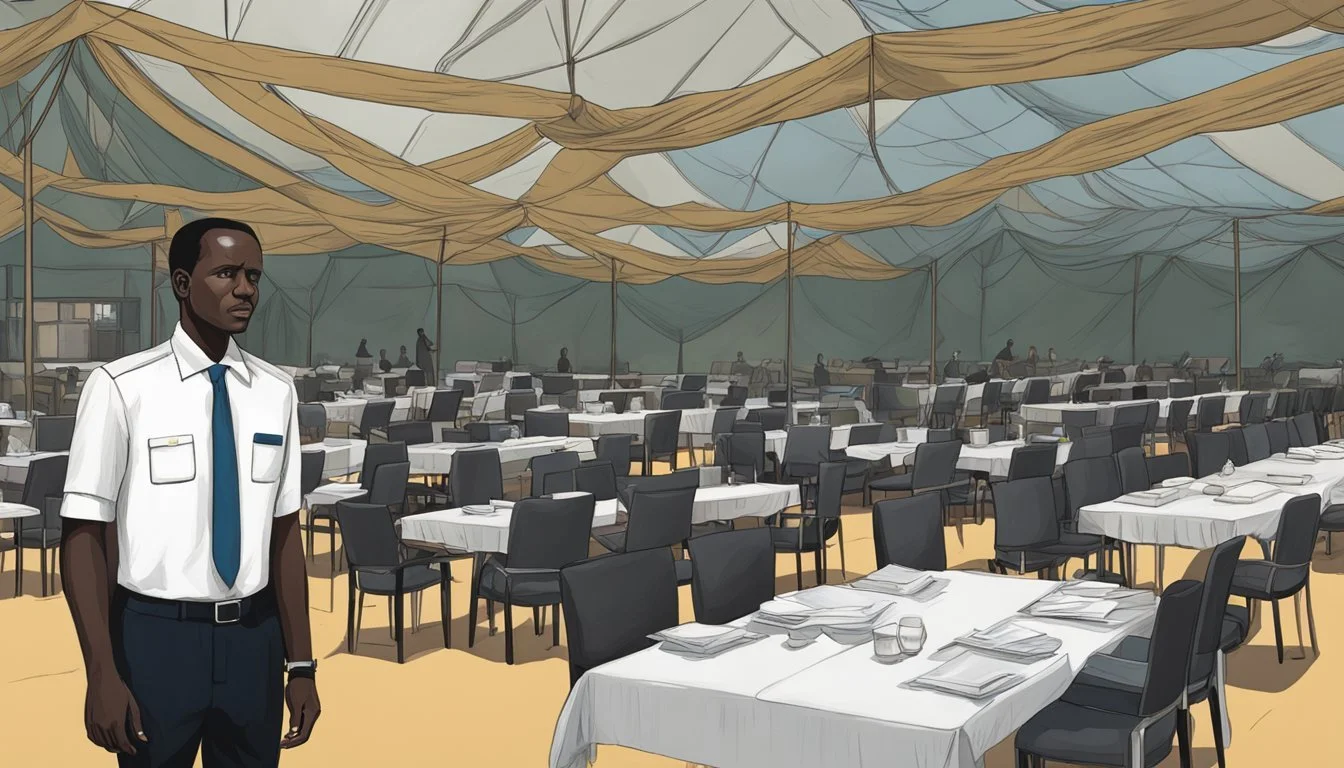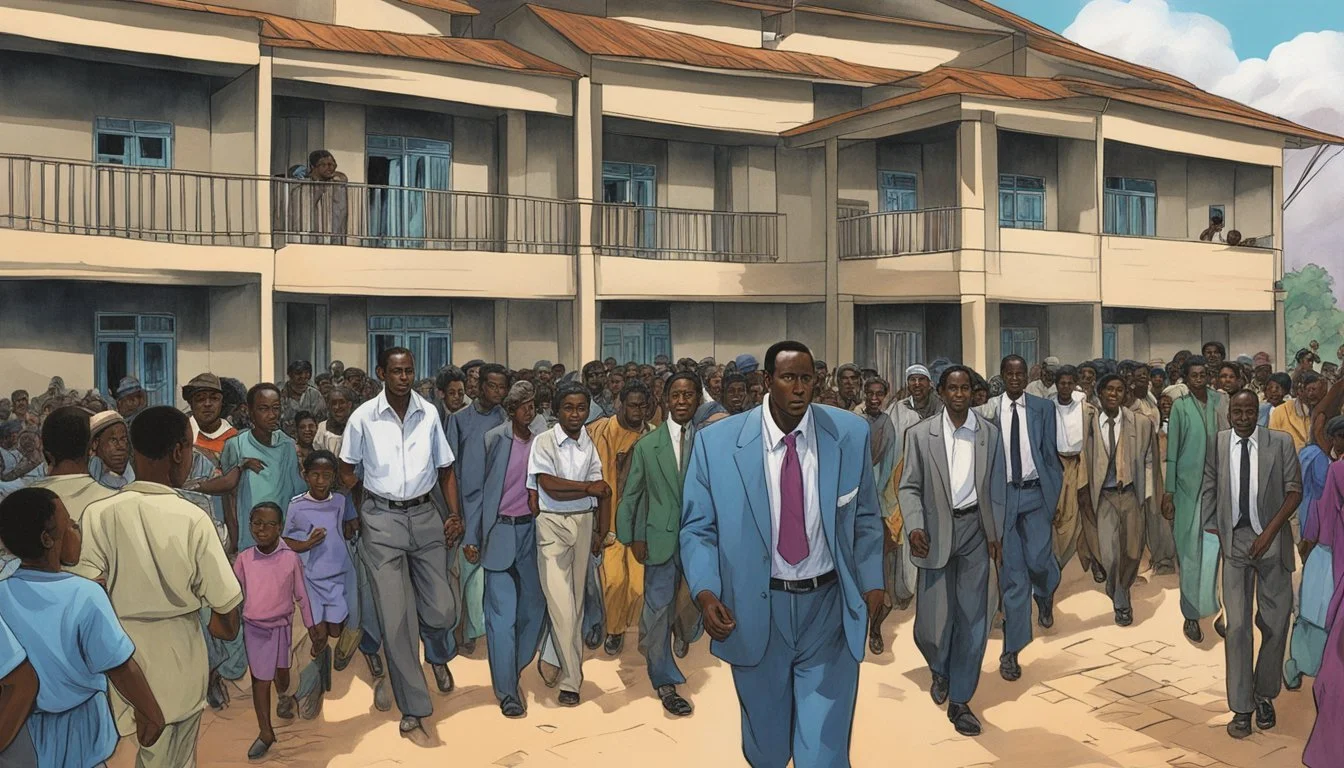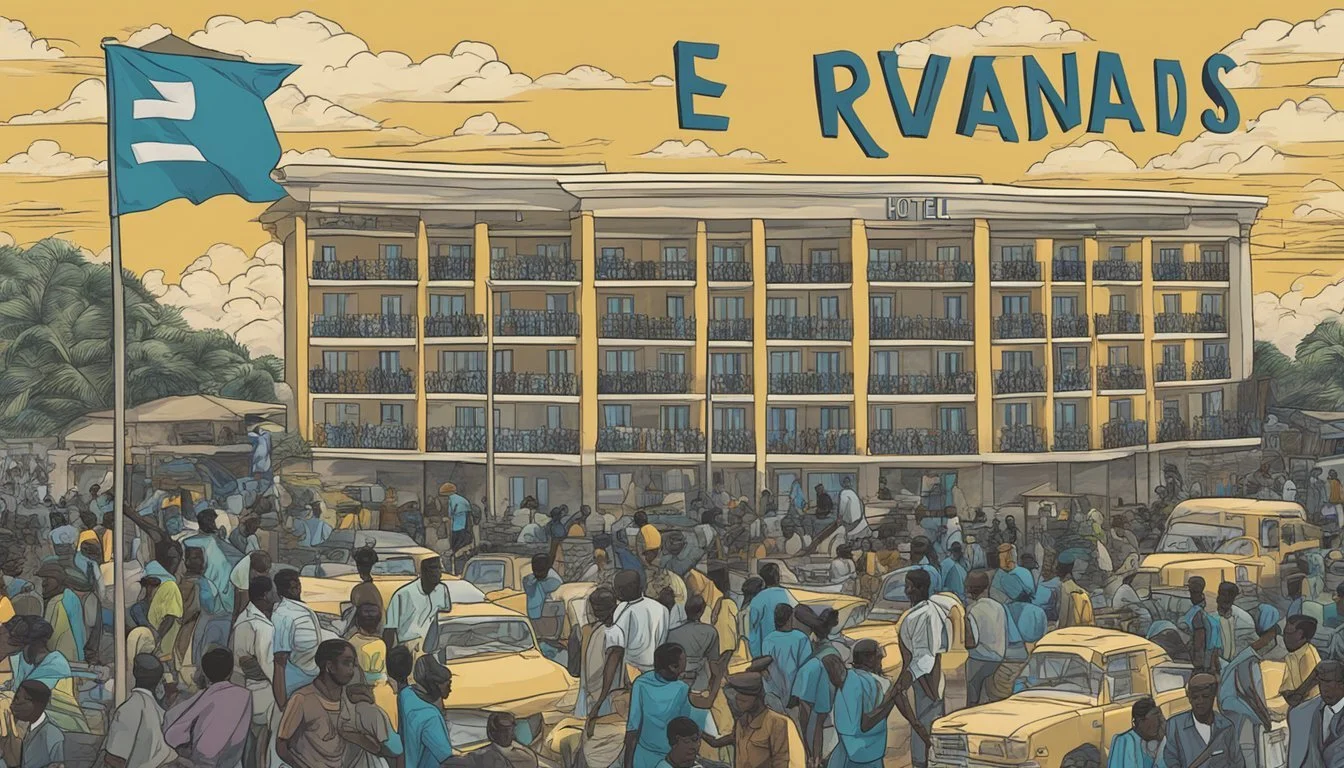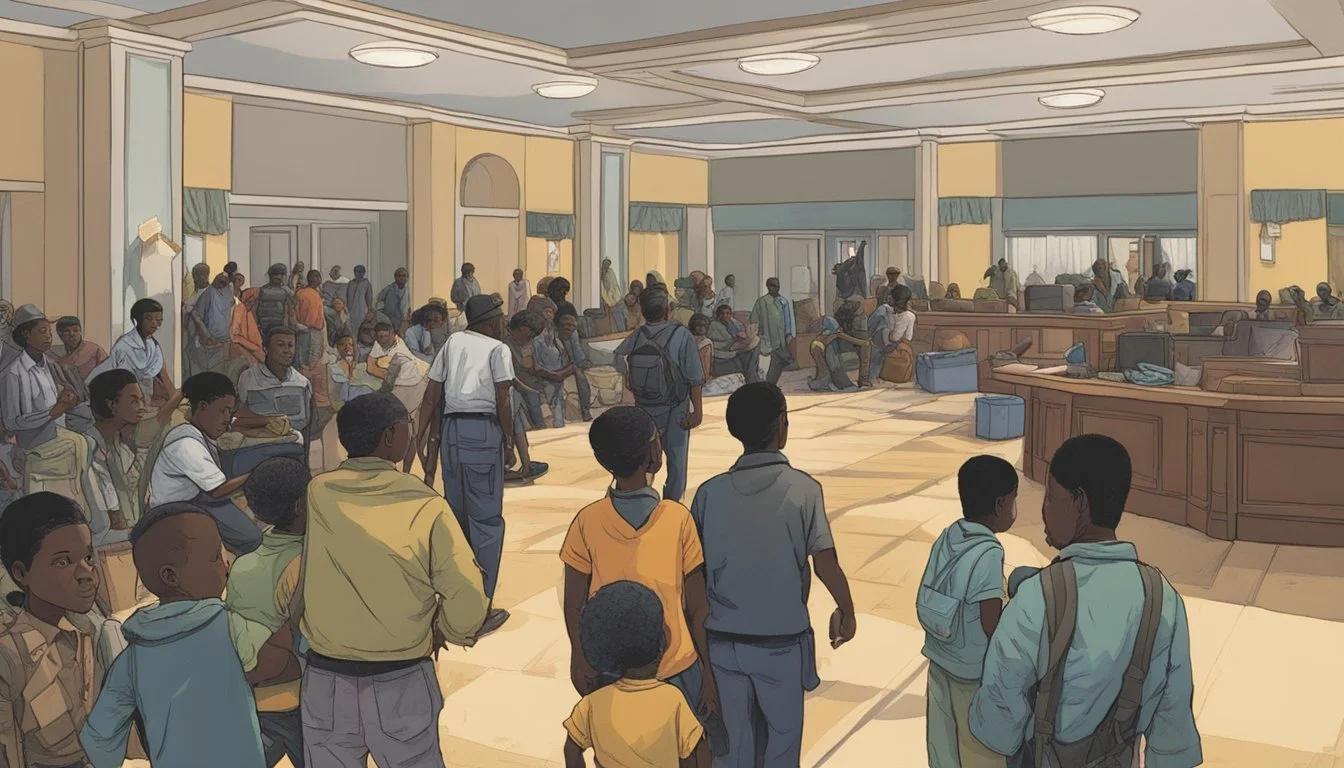Hotel Rwanda: Paul Rusesabagina's Actual Heroism During Genocide
Separating Fact from Fiction
Paul Rusesabagina's story of heroism during the Rwandan genocide captivated audiences worldwide through the film "Hotel Rwanda." As the manager of Hotel des Mille Collines in Kigali, Rusesabagina sheltered over 1,200 Tutsi and moderate Hutu refugees from the violent conflict that engulfed the nation in 1994. His quick thinking and resourcefulness saved countless lives during one of the darkest chapters in modern history.
The Rwandan genocide erupted between the Hutu majority and Tutsi minority, resulting in the deaths of an estimated 800,000 to 1 million people in just 100 days. Amidst this chaos, Rusesabagina transformed the luxury hotel into a sanctuary, using his connections and negotiation skills to protect those seeking refuge from the violence outside.
While "Hotel Rwanda" brought Rusesabagina international acclaim, his relationship with the Rwandan government has since become complex. In recent years, he faced terrorism-related charges and imprisonment, sparking debates about his legacy and the ongoing political tensions in Rwanda. Despite these controversies, Rusesabagina's actions during the genocide remain a testament to individual courage in the face of overwhelming brutality.
Life of Paul Rusesabagina
Paul Rusesabagina's journey from a hotel manager to an internationally recognized figure is marked by his actions during the Rwandan genocide. His life encompasses early struggles, a successful career in hospitality, and a pivotal role in saving lives during a dark chapter of history.
Early Life and Career
Paul Rusesabagina was born on June 15, 1954, in Rwanda. He grew up in a mixed Hutu-Tutsi family, which shaped his perspective on ethnic divisions. Rusesabagina pursued education and training in hotel management, eventually becoming fluent in French and English.
He began his career in the hospitality industry, working his way up through various positions. In the 1980s, Rusesabagina secured a job at the prestigious Hôtel des Mille Collines in Kigali. His skills and dedication led to his promotion to assistant general manager of the hotel.
Rusesabagina married and started a family. He later acquired Belgian citizenship, which would play a role in his future international connections.
Rise to Prominence during the Genocide
In April 1994, Rwanda descended into genocide. As manager of the Hôtel des Mille Collines, Rusesabagina made a critical decision to shelter Tutsi refugees and moderate Hutus.
He used his position, connections, and negotiation skills to protect 1,268 people within the hotel. Rusesabagina employed various tactics to keep the militias at bay, including bribery and maintaining the appearance of a functioning luxury hotel.
His actions during this period saved numerous lives. The story gained international attention, particularly after the release of the film "Hotel Rwanda" in 2004. Rusesabagina became known as a humanitarian hero, receiving awards and speaking engagements worldwide.
The 1994 Genocide in Context
The Rwandan genocide of 1994 emerged from a complex history of ethnic tensions and international inaction. It resulted in the deaths of an estimated 800,000 to 1 million Tutsis and moderate Hutus over a 100-day period.
Ethnic Tensions and Causes of the Conflict
Rwanda's colonial history under Belgian rule exacerbated divisions between Hutus and Tutsis. The Belgians favored Tutsis in positions of power, creating resentment among the Hutu majority.
After independence in 1962, Hutu-led governments implemented discriminatory policies against Tutsis. This fueled ongoing tensions and sporadic violence.
In 1990, the Tutsi-led Rwandan Patriotic Front (RPF) invaded from Uganda. This sparked a civil war and intensified anti-Tutsi propaganda.
The assassination of Hutu President Juvénal Habyarimana on April 6, 1994 triggered the genocide. Hutu extremists blamed Tutsis and used it as a pretext to begin systematic killings.
International Response and Lack Thereof
The international community largely failed to intervene effectively during the Rwandan genocide. The United Nations had a small peacekeeping force in Rwanda, but it lacked the mandate and resources to stop the violence.
Major world powers were reluctant to get involved. The United States, still reeling from a failed intervention in Somalia, avoided using the term "genocide" to sidestep legal obligations to act.
France, which had close ties to the Hutu-led government, was accused of supporting the regime responsible for the killings. Some French troops did establish a humanitarian zone in southwest Rwanda.
The RPF eventually stopped the genocide by defeating government forces in July 1994. By then, the scale of the atrocities had shocked the world and prompted belated humanitarian responses.
The Heroism of Paul Rusesabagina
Paul Rusesabagina's actions during the Rwandan genocide demonstrated extraordinary courage and compassion. He risked his life to protect over a thousand people from certain death, using his position and resources to create a sanctuary amid chaos.
Saving Lives at Hotel des Mille Collines
As the manager of Hotel des Mille Collines in Kigali, Rusesabagina transformed the luxury establishment into a refuge. He sheltered approximately 1,200 Tutsis and moderate Hutus from April to July 1994.
Rusesabagina used his connections and negotiation skills to keep the hotel supplied with food and water. He bribed military officials with money and alcohol to prevent attacks on the refugees.
His quick thinking and resourcefulness saved countless lives. Rusesabagina maintained a semblance of normalcy within the hotel, providing a haven from the violence raging outside.
Global Recognition and Depiction in 'Hotel Rwanda'
Rusesabagina's heroism gained international attention through the 2004 film "Hotel Rwanda." The movie, starring Don Cheadle, brought his story to a global audience.
His actions earned him numerous humanitarian awards. Rusesabagina used his platform to raise awareness about genocide prevention and human rights.
The film's success led to speaking engagements and a memoir. However, controversy later emerged regarding the accuracy of some portrayals and Rusesabagina's relationship with the Rwandan government.
Despite debates, Rusesabagina's core act of saving lives during a time of extreme violence remains undisputed. His story continues to inspire discussions on individual courage in the face of systemic brutality.
Post-Genocide Era and Political Aspirations
Paul Rusesabagina's role evolved from hotelier to political activist in the years following the Rwandan genocide. He became increasingly critical of the post-genocide government and its policies.
Formation of Opposition Groups
Rusesabagina founded the Party for Democracy in Rwanda (PDR-Ihumure) in 2006. This political party aimed to promote democratic values and challenge the ruling party's dominance. He also helped form the Rwandan Movement for Democratic Change (MRCD), a coalition of opposition groups.
These organizations sought to provide alternative political voices in Rwanda's political landscape. Rusesabagina leveraged his international profile to raise awareness about issues he saw in Rwanda's governance.
Criticism of Kagame's Regime
Rusesabagina became a vocal critic of President Paul Kagame's government. He accused the regime of human rights abuses and suppression of political dissent. His outspoken stance led to tensions with Rwandan authorities.
He argued that Kagame's government was becoming increasingly authoritarian. Rusesabagina's criticism focused on:
Lack of press freedom
Alleged political assassinations
Restrictions on opposition parties
His activism resulted in legal troubles. In 2020, Rusesabagina was arrested and later convicted on terrorism-related charges, which he and his supporters claim were politically motivated.
Controversy and Arrest
Paul Rusesabagina's reputation as a hero was challenged when he faced serious legal troubles. His detention and subsequent trial sparked international debate about the nature of his actions and Rwanda's justice system.
Circumstances of Rusesabagina's Detention
In August 2020, Rusesabagina mysteriously appeared in Kigali, Rwanda. He had boarded a plane in Dubai, believing he was heading to Burundi. Instead, he found himself in Rwanda, where authorities promptly arrested him.
The Rwandan government accused Rusesabagina of supporting rebel groups and financing terrorism. These charges stemmed from his involvement with opposition groups critical of President Paul Kagame's administration.
Rusesabagina's family and supporters claimed he was kidnapped and illegally brought to Rwanda. They argued that his arrest was politically motivated due to his outspoken criticism of the Rwandan government.
International Reaction to His Incarceration
Rusesabagina's arrest and trial drew widespread international attention. Human rights organizations expressed concerns about the fairness of the proceedings.
The United States, Belgium, and the European Parliament called for Rusesabagina's release. They questioned the legality of his arrest and the impartiality of Rwanda's judicial system.
In September 2021, Rusesabagina was found guilty of terrorism-related charges. The court sentenced him to 25 years in prison, a decision that further intensified global scrutiny of Rwanda's handling of political dissent.
Supporters of Rusesabagina continued to advocate for his release, maintaining that the charges were fabricated to silence a prominent critic of the government.
The Trial and Human Rights Concerns
Paul Rusesabagina's trial and subsequent conviction sparked significant controversy and raised concerns about due process and human rights violations.
Allegations of an Unfair Process
Rusesabagina's trial began in February 2021 and concluded with a 25-year prison sentence in September of that year. Critics argued that the proceedings lacked transparency and fairness. Rusesabagina claimed he was kidnapped and brought to Rwanda against his will, raising questions about the legality of his detention.
His family and lawyers reported limited access to him during his imprisonment. They alleged that he was subjected to solitary confinement and denied proper medical care. These claims fueled doubts about the integrity of the judicial process.
Human Rights Organizations' Stance
Numerous human rights groups voiced concerns about Rusesabagina's treatment and trial. Amnesty International called the proceedings a "sham," citing irregularities in the arrest and pre-trial detention. Human Rights Watch questioned the fairness of the hearing, pointing to potential violations of international standards.
These organizations emphasized the importance of ensuring a fair and impartial trial. They called for an independent investigation into the circumstances surrounding Rusesabagina's arrest and detention. The international community closely monitored the case, with many expressing doubts about the validity of the charges and the fairness of the proceedings.
Global Advocacy and Family's Fight for Justice
Paul Rusesabagina's imprisonment sparked an international campaign for his release. His family, supporters, and governments engaged in diplomatic efforts and legal strategies to secure his freedom.
Mobilizing Support from the US and Belgium
Carine Kanimba, Rusesabagina's daughter, led efforts to rally support from the US and Belgium. As a Belgian citizen and US permanent resident, Rusesabagina's case drew attention from both countries.
The US State Department designated him as "wrongfully detained" in May 2022. This classification elevated his case and mobilized additional government resources.
Belgian officials also advocated for Rusesabagina's release through diplomatic channels. They highlighted concerns about the fairness of his trial and detention conditions.
Legal Efforts and Public Campaigns
Rusesabagina's family launched legal challenges in multiple jurisdictions. They filed complaints with the UN Working Group on Arbitrary Detention and the East African Court of Justice.
Public awareness campaigns kept his case in the spotlight. Social media hashtags like #FreeRusesabagina spread his story globally.
High-profile supporters, including members of the US Congress, called for his release. They wrote letters, issued statements, and held hearings on his situation.
Human rights organizations like Amnesty International and Human Rights Watch documented irregularities in Rusesabagina's arrest and trial. Their reports bolstered arguments for his freedom.
Paul Rusesabagina's Legacy
Paul Rusesabagina's actions during the Rwandan genocide left an indelible mark on history and popular culture. His story became a symbol of courage and compassion amidst unimaginable horror.
Impact on Rwanda's History and Memory of Genocide
Rusesabagina's efforts to save lives at the Hôtel des Mille Collines became a pivotal chapter in Rwanda's genocide narrative. He sheltered over 1,200 Tutsis and moderate Hutus, using his position and resources to protect them from certain death.
His actions exemplified individual heroism in the face of systematic violence. Rusesabagina's story helped preserve the memory of those dark days and highlighted the importance of moral courage.
In 2005, Rusesabagina received the Presidential Medal of Freedom from U.S. President George W. Bush, recognizing his bravery and humanitarian efforts.
Influence on Film and Media: 'Hotel Rwanda'
The 2004 film "Hotel Rwanda" brought Rusesabagina's story to a global audience. Don Cheadle's portrayal of Rusesabagina earned critical acclaim and numerous award nominations.
The movie raised international awareness about the Rwandan genocide. It sparked discussions on human rights, intervention, and the world's response to mass atrocities.
"Hotel Rwanda" became a cultural touchstone, used in schools and universities to teach about genocide and moral responsibility. The film's impact extended beyond entertainment, serving as a powerful educational tool.
Rusesabagina's depiction in the movie solidified his status as a humanitarian icon. It inspired many to learn more about Rwanda's history and engage with human rights causes.




